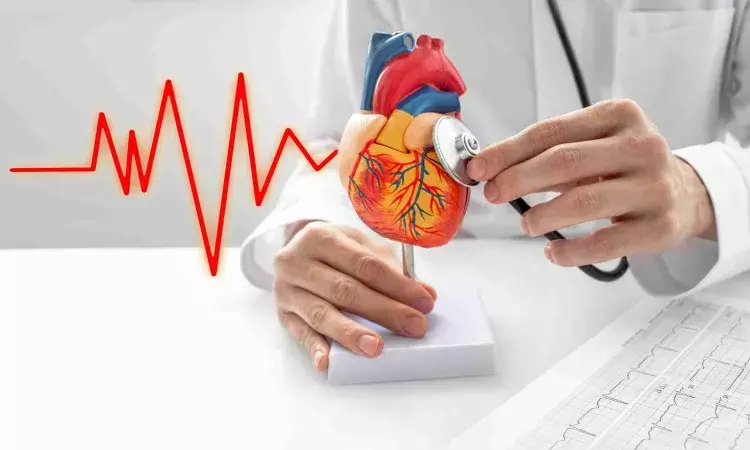- Home
- Medical news & Guidelines
- Anesthesiology
- Cardiology and CTVS
- Critical Care
- Dentistry
- Dermatology
- Diabetes and Endocrinology
- ENT
- Gastroenterology
- Medicine
- Nephrology
- Neurology
- Obstretics-Gynaecology
- Oncology
- Ophthalmology
- Orthopaedics
- Pediatrics-Neonatology
- Psychiatry
- Pulmonology
- Radiology
- Surgery
- Urology
- Laboratory Medicine
- Diet
- Nursing
- Paramedical
- Physiotherapy
- Health news
- Fact Check
- Bone Health Fact Check
- Brain Health Fact Check
- Cancer Related Fact Check
- Child Care Fact Check
- Dental and oral health fact check
- Diabetes and metabolic health fact check
- Diet and Nutrition Fact Check
- Eye and ENT Care Fact Check
- Fitness fact check
- Gut health fact check
- Heart health fact check
- Kidney health fact check
- Medical education fact check
- Men's health fact check
- Respiratory fact check
- Skin and hair care fact check
- Vaccine and Immunization fact check
- Women's health fact check
- AYUSH
- State News
- Andaman and Nicobar Islands
- Andhra Pradesh
- Arunachal Pradesh
- Assam
- Bihar
- Chandigarh
- Chattisgarh
- Dadra and Nagar Haveli
- Daman and Diu
- Delhi
- Goa
- Gujarat
- Haryana
- Himachal Pradesh
- Jammu & Kashmir
- Jharkhand
- Karnataka
- Kerala
- Ladakh
- Lakshadweep
- Madhya Pradesh
- Maharashtra
- Manipur
- Meghalaya
- Mizoram
- Nagaland
- Odisha
- Puducherry
- Punjab
- Rajasthan
- Sikkim
- Tamil Nadu
- Telangana
- Tripura
- Uttar Pradesh
- Uttrakhand
- West Bengal
- Medical Education
- Industry
Lower risk of death, major adverse cardiovascular events in hyperthyroid patients treated with surgery than with medication

Hyperthyroidism, or overactive thyroid, happens when your thyroid gland makes more thyroid hormones than your body needs. Excessive thyroid hormones from hyperthyroidism elevate cardiovascular risks. While hyperthyroidism can be treated with anti-thyroid drugs, radioactive iodine ablation or surgery, evidence comparing long-term benefits and risks of the three treatment modalities presents a challenge for informed decision-making and likely contributes to variations in treatment.
In a new study from Boston University Chobanian & Avedisian School of Medicine, researchers have found that hyperthyroid patients treated with surgery had a 47% lower risk of death and a 24% lower risk of major adverse cardiovascular events than patients treated with medication. They also found that patients treated with radioactive iodine had a 55% lower likelihood of major adverse cardiovascular events compared to the patients treated with medication.
“While there are three main treatment options for this condition, the selection of therapy needs to be individualized-this is not one-size-fits-all,” explains co-corresponding author Elizabeth Pearce, MD, MSc, professor of medicine at the school. “Our study suggests that it may be important to consider an individual's cardiovascular risk in making decisions about hyperthyroidism treatment.”
The researchers used data from 114,062 patients from Taiwan's National Health Insurance Research Database who were diagnosed with hyperthyroidism between 2011 and 2020. They compared rates of major cardiovascular events (acute myocardial infarction, stroke, heart failure, and death from cardiovascular disease) and death from all causes in patients treated with each of the three types of hyperthyroidism treatment.
According to the researchers, thyroid surgery or radioactive iodine treatment may be better treatment options than long-term anti-thyroid drug use in patients with hyperthyroidism who also are at high risk for cardiovascular diseases. “The improved outcomes observed in our study with surgery or radioactive iodine may have been related to more prompt and complete resolution of hyperthyroidism than was achieved with medication. However, future prospective studies will be needed to better understand these risks,” added Pearce who also is an endocrinologist at Boston Medical Center.
These finding appear online in JAMA Network Open.
Dr Kamal Kant Kohli-MBBS, DTCD- a chest specialist with more than 30 years of practice and a flair for writing clinical articles, Dr Kamal Kant Kohli joined Medical Dialogues as a Chief Editor of Medical News. Besides writing articles, as an editor, he proofreads and verifies all the medical content published on Medical Dialogues including those coming from journals, studies,medical conferences,guidelines etc. Email: drkohli@medicaldialogues.in. Contact no. 011-43720751


